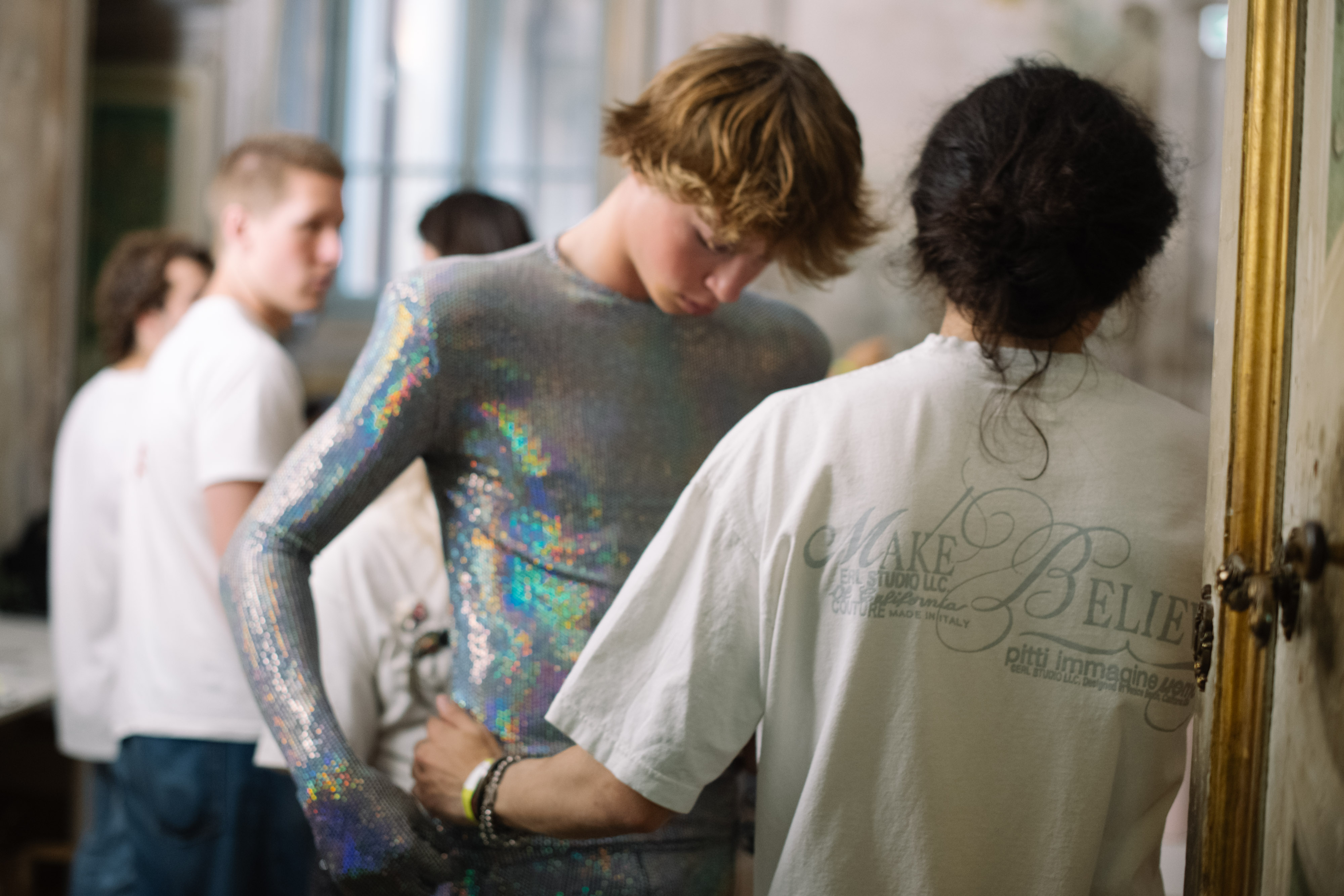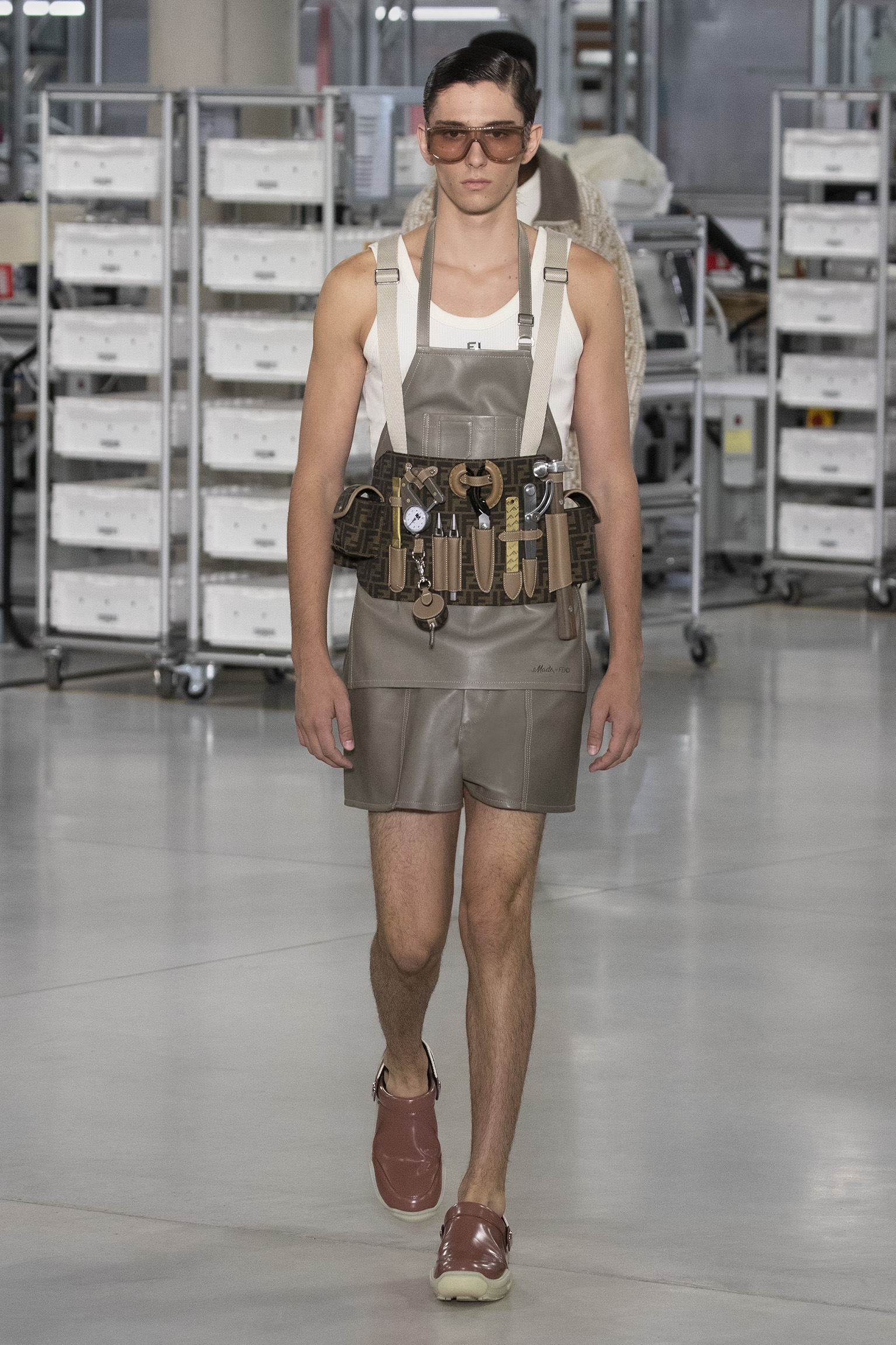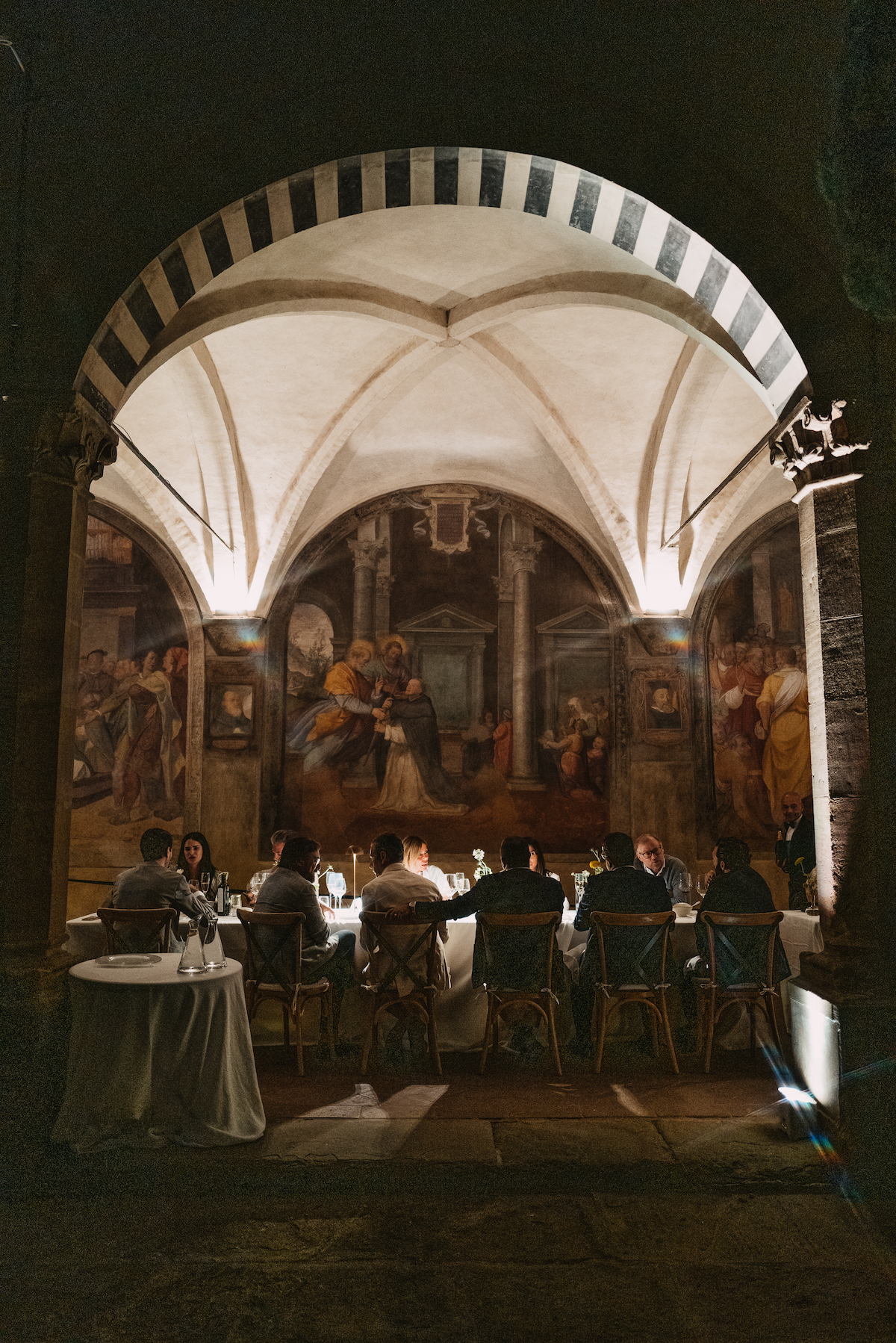
So the whispers went, it was the first time it had ever rained at the June edition of Pitti Uomo – the Florentine menswear fair which runs twice-yearly – a fact that threatened to derail Wednesday evening’s crescendo, a blockbuster runway show held by Italian retailer Luisaviaroma and British Vogue. Staged at the hilltop Piazzale Michelangelo against expansive views of the Tuscan city below, the glimmering spectacle came complete with a live performance from Andrea Bocelli and a panoply of supermodels, past and present, flown in from around the globe (Pat Cleveland, Mariacarla Boscono, Natalia Vodianova, Natasha Poly and Paloma Elsesser among them). As the sun set, the rain stopped and the show went on, watched on by a front row that included (to much fanfare) Hollywood heavyweight Leonardo DiCaprio.
If the show had little to say about the current state of menswear – there were just a handful of men’s looks in the show itself – it was a testament to the unique pulling power that Pitti Uomo, now in its 51st year, continues to wield. Proof of this came in this season’s highest-billed guest star, Roman fashion house Fendi, which chose to present its latest menswear collection as part of the programme. Transporting guests out of the city in a phalanx of people carriers and into the rolling Tuscan countryside, the collection – designed by the artistic director of menswear and accessories Silvia Venturini Fendi – was presented on the workshop floor of the house’s newly opened Fendi factory in Capannuccia, as artisans constructed the house’s leather goods as mise-en-scène.

Venturini Fendi called the 14,000 sq m building, designed by Italian architecture studio Piuarch to fade discreetly into the landscape beyond, as ‘the pulsing heart of Fendi, a place symbolic of creation, where development, innovation, craftsmanship training and production are reunited under the same roof’. The collection riffed on Fendi’s long history of craftsmanship – Silvia Venturini Fendi’s grandmother Adele Fendi came to Florence from Rome over a century ago to learn the art of leatherwork – with pieces that playfully reimagined workwear in the creative director’s irreverent, luxurious style, from leather carpenter trousers and chore jackets to Fendi-branded tool belts, measuring tapes and clogs. At the show’s close, the artisans joined Venturini Fendi for her runway bow.
At the Pitti Uomo fair itself, which takes place at the historic Fortezza de Basso, a mood of discreet luxury continued at Brunello Cucinelli, with a S/S 2024 collection that played on 1970s archetypes in the designer’s luxuriously restrained style. There were impossibly light suede trench coats, paisley-patterned shirts, and sweatsuit-style zip-up jackets that recalled those worn on tennis courts circa the heyday of John McEnroe and Björn Borg (a full tennis collection was also shown alongside, complete with sleeveless cable-knit sweaters, striped shorts and lightweight T-shirts in sportier performance fabrics). As ever, Cucinelli opened proceedings with a spectacular dinner in the cloisters of Florence‘s Santa Maria Novella church on Tuesday evening, an expression of his longtime alliance with the fair.

Historic Scottish knitwear brand Johnstons of Elgin was also part of line-up at the Fortezza, showing a collection that broadened its commitment to creating an array of knitwear and cashmere pieces specifically for summer (the brand still remains best known for its thicker winter styles). This meant beautiful layers of lightweight knit staples – whether super-fine crewneck cashmere jumpers, fuzzy ribbed zip-up jackets or knitted hoodies in super-soft textures. Alongside, new merino-cotton scarves were created to provide an airy extra layer on cooler evenings. Titling the S/S 2024 collection ‘A Radiant Sunset’, the brand says it wants it to capture the ‘warm glow of a summer evening’.
Herno is also a brand for which making and craft is central; established over 70 years ago in northern Italy, founder Giuseppe Marenzi and his wife Alessandra Diana began the brand after discovering a way to treat cotton with castor oil to protect from the rain. Always a distinct presence at the fair, with a vast pavilion in the grounds of the Fortezza, the brand’s focus here was on ‘full look’ dressing – a statement that despite its synonymy with outerwear, Herno now creates a comprehensive wardrobe from the sneaker up. The brand described the S/S 2024 collection as ‘a rediscovered and renewed vision’ that placed focus on the innate elegance and refined construction which have been pillars of Herno since the beginning.

The pieces themselves were contemporary in design – simple jogging-style trousers, gently oversized tailoring, crepe polo shirts and bermuda shorts – while the vivid patterns of recent collections were entirely scrapped in favour of a restrained palette of navy blue, black and military green (cornflower blue, red, and yellow). In fact, the only pattern in the collection was the house’s monogram. ‘Subtracting elements to add value,’ said Herno of the collection’s aim.
Closing out proceedings late on Thursday evening in the central courtyard of Palazzo Corsini was Eli Russell Linnetz’s cult California-based label ERL. Linnetz rose to fame as creative director for musical artists including Lady Gaga and Kid Cudi, his fledgling label getting its first international spotlight when Linnetz designed Dior’s Spring 2023 menswear collection with Kim Jones (the show was held in Venice Beach, where Linnetz is based and grew up). That collection ran with the tagline ’Californian couture’, an apt descriptor for Linnetz’s wider approach, which reworks archetypal American garments – from football uniforms to surf and skatewear. ‘An original, often ironic and irreverent reinterpretation of American clichés, both eternal and modern-day,’ described Lapo Cianchi, director of communication and special events at Pitti Immagine, of his work.

The cinematic offering – set against a vivid neon green backdrop and runway – saw Linnetz conjure a troupe of Californian surfers in Florence in 2176 (when sea levels have risen and the city is underwater, said Linnetz). As they masqueraded as rich kids and breaking into a ball at the ambassador’s house, the collection imagined them being let loose on the closet – ‘discovering opulent eveningwear, relics and found objects from around the world’. As such, there was a surreal, dressed-up feel to the collection: slick-to-the-body shimmering body suits and encrusted tailoring – near-cartoonish in proportion – met more idiosyncratic elements, like a metal crest held in the hand or a model clad as the Statue of Liberty.
Linnetz also created an intervention at the fair itself, an enormous sunken Statue of Liberty in the central pool of the Fortezza de Basso. Reminiscent of the poster for the dystopian 1980s movie Escape from New York, it captured the visual ambition of the designer, who previously has shown his collection via lookbooks that he shoots himself. Speaking earlier in the day, Linnetz said that he might never host another runway show for the brand. Such is Pitti Uomo’s unique appeal – moments of magic, viewed once and never again.







